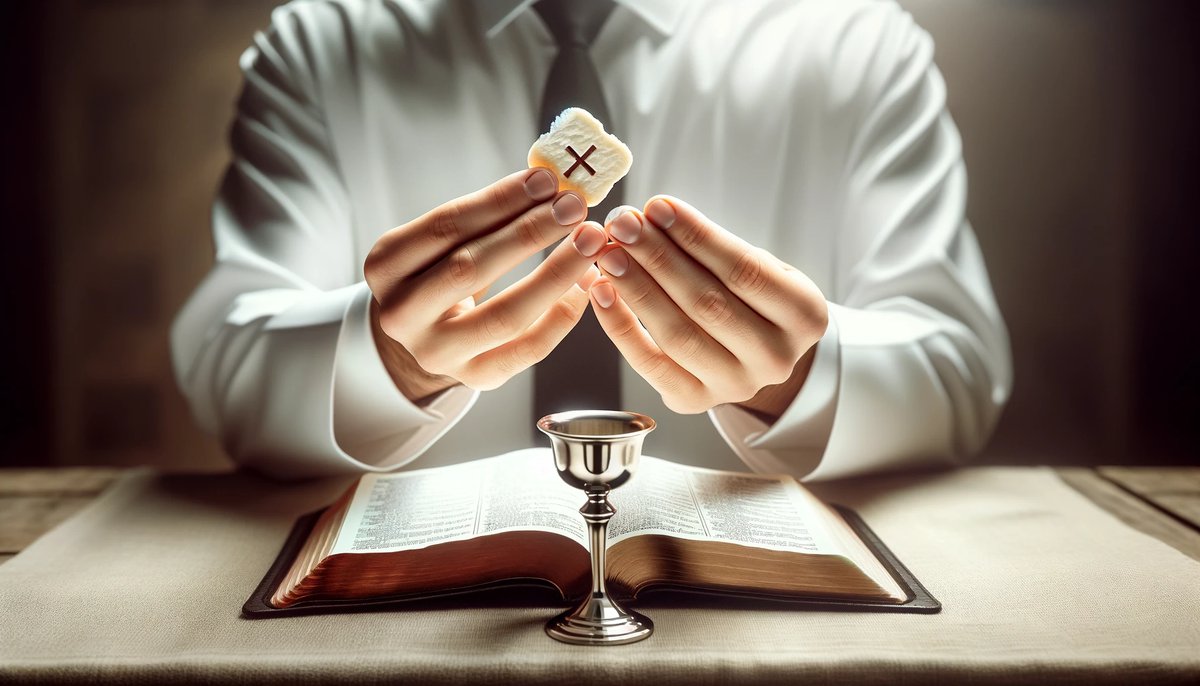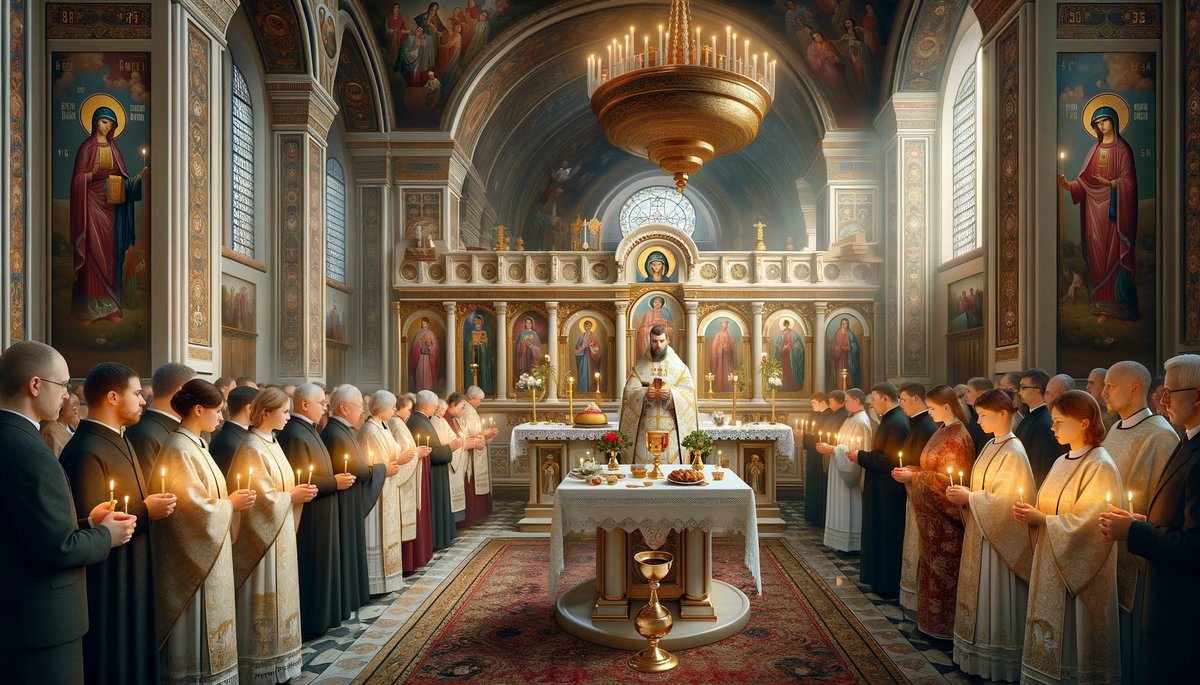Home>Theology and Spirituality>How To Lead Communion


Theology and Spirituality
How To Lead Communion
Published: February 19, 2024
Peter Smith, Editorial Director at Christian.net, combines deep insights into faith, politics, and culture to lead content creation that resonates widely. Awarded for his contributions to religious discourse, he previously headed a major organization for religious communicators, enhancing dialogue on faith's societal impacts.
Learn how to lead communion with confidence and reverence. Explore the theological and spiritual significance of this sacred practice. Enhance your understanding of theology and spirituality today.
(Many of the links in this article redirect to a specific reviewed product. Your purchase of these products through affiliate links helps to generate commission for Christian.net, at no extra cost. Learn more)
Table of Contents
Introduction
Communion, also known as the Lord's Supper or the Eucharist, holds a central place in the Christian faith. It is a sacred ritual that symbolizes the body and blood of Jesus Christ, and it serves as a profound expression of unity among believers. As a leader in the church, guiding the congregation through the communion service is a significant responsibility that requires reverence, preparation, and a deep understanding of its spiritual significance.
The act of partaking in communion traces back to the Last Supper, where Jesus shared bread and wine with his disciples, instructing them to do the same in remembrance of him. This pivotal event forms the foundation of the communion service, emphasizing the spiritual connection between Christ and his followers. Therefore, as a leader entrusted with facilitating this sacred observance, it is essential to approach the task with humility and a heart filled with reverence for the profound spiritual symbolism it embodies.
Leading communion is not merely a ceremonial duty; it is an opportunity to guide the congregation in a deeply spiritual and transformative experience. It is a time to reflect on the sacrificial love of Christ, to seek forgiveness, and to renew one's commitment to living a life aligned with the teachings of Jesus. The communion service provides a sacred space for believers to commune with God and with one another, fostering a sense of unity and spiritual nourishment.
In the following sections, we will delve into the multifaceted aspects of leading communion, from understanding its significance to preparing for the service and ultimately guiding the congregation through this deeply meaningful ritual. As we embark on this journey, let us approach the subject with reverence and a genuine desire to embrace the spiritual richness that communion offers to both the leader and the congregation.
Read more: How Can We Lead People To Christ Jesus?
Understanding the significance of communion
At the heart of the Christian faith, communion stands as a profound symbol of spiritual nourishment, unity, and remembrance. It encapsulates the essence of Christ's sacrificial love and serves as a tangible expression of the believer's connection to the divine. Understanding the significance of communion is pivotal for those entrusted with leading this sacred observance.
Communion holds a dual significance, representing both a commemoration of Christ's sacrifice and a celebration of the believer's spiritual union with Christ and fellow believers. The act of partaking in the bread and wine symbolizes the body and blood of Jesus, signifying his ultimate sacrifice for the redemption of humanity. This solemn remembrance fosters a deep sense of gratitude and humility, reminding believers of the immense love demonstrated through Christ's selfless act.
Furthermore, communion serves as a unifying force within the Christian community. As believers come together to partake in this sacred ritual, they are reminded of their shared faith and the communal bond that transcends individual differences. It is a time to set aside personal concerns and to embrace the collective identity as members of the body of Christ. The act of partaking in communion underscores the interconnectedness of believers, fostering a sense of unity, empathy, and mutual support.
Moreover, communion offers spiritual nourishment to the participants. It is a moment of introspection and renewal, providing an opportunity for believers to seek forgiveness, to recommit to living a life aligned with Christ's teachings, and to draw strength from the spiritual sustenance it offers. The act of partaking in communion is a deeply personal and transformative experience, allowing individuals to connect with the divine and to find solace and guidance in their faith journey.
In essence, understanding the significance of communion goes beyond the mere act of partaking in bread and wine. It encompasses a profound acknowledgment of Christ's sacrifice, a celebration of unity within the Christian community, and a source of spiritual nourishment and renewal. As leaders prepare to guide the congregation through the communion service, embracing the multifaceted significance of this sacred ritual is paramount in fostering a meaningful and spiritually enriching experience for all participants.
Preparing for communion
Preparing for the communion service is a sacred and essential aspect of leading this deeply meaningful ritual. It involves meticulous attention to detail, spiritual readiness, and a heart filled with reverence for the significance of the occasion. As a leader entrusted with guiding the congregation through communion, thorough preparation is crucial to ensuring a reverent and spiritually enriching experience for all participants.
Spiritual Preparation
Before delving into the practical aspects of preparing for the communion service, it is paramount to emphasize the significance of spiritual readiness. As a leader, cultivating a deep sense of reverence and spiritual preparedness is essential. This involves personal reflection, prayer, and a genuine desire to approach the communion service with humility and a heart attuned to the sacredness of the occasion. Taking time for personal introspection and seeking spiritual guidance can profoundly impact the leader's ability to guide the congregation through a meaningful communion experience.
Practical Preparation
From a practical standpoint, meticulous preparation is necessary to ensure the smooth facilitation of the communion service. This includes coordinating with the church staff to ensure that the necessary elements, such as bread, wine, and any additional items, are readily available. Attention to detail in setting up the communion table, arranging the seating, and ensuring the appropriate vessels and linens are in place contributes to the reverent atmosphere essential for the communion service.
Additionally, communicating with the worship team and other participants in the service is vital to ensure a cohesive and harmonious flow throughout the communion observance. Providing clear guidance and instructions to those involved in the service, such as the order of service, readings, and musical selections, contributes to a seamless and reverent experience for the congregation.
Read more: How To Do Communion
Scriptural Reflection
Engaging in scriptural reflection related to the significance of communion can further enrich the leader's preparation. Delving into passages such as the accounts of the Last Supper in the Gospels, Paul's teachings on communion in the New Testament, and other relevant scriptures can deepen the leader's understanding of the spiritual and theological underpinnings of the communion service. This, in turn, equips the leader to provide insightful and meaningful reflections during the service, fostering a deeper connection with the congregation.
Rehearsal and Contemplation
Conducting a rehearsal of the communion service, if feasible, can help the leader and other participants become familiar with the flow of the service, ensuring a reverent and seamless experience for the congregation. Additionally, setting aside time for contemplation and prayer in the physical space where the communion service will take place can further enhance the leader's spiritual preparedness and attunement to the sacredness of the occasion.
In essence, preparing for communion encompasses both spiritual and practical dimensions. It requires a deep sense of reverence, meticulous attention to detail, and a commitment to fostering a spiritually enriching experience for the congregation. By embracing thorough preparation, both in spiritual readiness and practical arrangements, leaders can guide the congregation through a communion service that embodies the profound significance of this sacred ritual.
Leading the communion service
Leading the communion service is a sacred responsibility that requires a delicate balance of reverence, guidance, and spiritual insight. As the congregation gathers to partake in this deeply meaningful ritual, the leader plays a pivotal role in facilitating an atmosphere of solemnity, unity, and spiritual nourishment.
Setting the Tone
The leader's demeanor and words set the tone for the communion service. It is essential to convey a sense of reverence and humility, acknowledging the sacredness of the occasion. A gentle and composed demeanor can help create an atmosphere conducive to introspection and spiritual communion.
Read more: How To Explain Communion To A Child
Expressing Gratitude and Remembrance
Before partaking in the bread and wine, the leader often offers words of gratitude and remembrance, echoing the sentiments expressed by Jesus during the Last Supper. This serves as a poignant reminder of Christ's sacrificial love and the profound significance of the communion ritual.
Providing Spiritual Reflection
Guiding the congregation through a brief reflection on the spiritual significance of communion can deepen the participants' understanding and engagement with the ritual. Sharing insights from relevant scriptures, such as the accounts of the Last Supper and Paul's teachings on communion, can enrich the communal experience and foster a deeper connection with the divine.
Facilitating the Act of Communion
As the congregation partakes in the bread and wine, the leader plays a central role in facilitating this sacred act. Offering the elements with solemnity and grace, and providing moments of quiet reflection, allows participants to engage in a deeply personal and spiritual communion with Christ and fellow believers.
Fostering Unity and Community
Throughout the communion service, the leader has the opportunity to emphasize the communal aspect of the ritual. Encouraging a sense of unity, empathy, and mutual support among the participants can reinforce the interconnectedness of the congregation as members of the body of Christ.
Read more: How To Do Communion At Home
Concluding with Blessings and Benediction
Concluding the communion service with blessings and a benediction can provide a sense of closure and spiritual affirmation. Offering words of blessing and encouragement as the congregation prepares to depart can leave a lasting impression, nurturing a sense of spiritual upliftment and renewed commitment to living out the principles embodied in the communion ritual.
In essence, leading the communion service demands a delicate blend of reverence, guidance, and communal engagement. By setting a reverent tone, providing spiritual reflection, and fostering a sense of unity, the leader plays a vital role in guiding the congregation through a deeply meaningful and spiritually enriching communion experience.
Conclusion
In conclusion, leading the communion service is a sacred responsibility that transcends the mere facilitation of a ritual; it embodies a profound opportunity for spiritual connection, communal unity, and personal transformation. As leaders guide the congregation through the communion service, they carry the weight of conveying the solemn remembrance of Christ's sacrifice, fostering a sense of unity within the Christian community, and providing a space for spiritual nourishment and renewal.
The significance of communion extends beyond the physical act of partaking in bread and wine; it encapsulates the essence of Christ's sacrificial love and the believer's profound connection to the divine. It serves as a poignant reminder of the Last Supper, where Jesus shared a meal with his disciples, imparting a timeless message of love, humility, and unity. Therefore, as the communion service concludes, it is essential to leave the congregation with a deep sense of gratitude for Christ's sacrifice and a renewed commitment to embodying the principles of love, compassion, and unity in their lives.
Furthermore, the communion service provides a sacred space for believers to set aside differences and embrace their shared identity as members of the body of Christ. It fosters a sense of communal unity, empathy, and mutual support, transcending individual concerns and nurturing a collective spirit of belonging and interconnectedness. As the leader concludes the communion service, it is paramount to impart blessings and words of encouragement, leaving the congregation with a sense of spiritual upliftment and a reaffirmed commitment to living out the principles embodied in the communion ritual.
In essence, the conclusion of the communion service marks the beginning of a renewed journey for the congregation, infused with a deepened sense of spiritual connection, communal unity, and personal commitment to embodying the teachings of Christ. It is a time to carry the essence of the communion experience into daily life, fostering a spirit of love, compassion, and unity within the Christian community and beyond. As leaders guide the congregation through this sacred observance, the conclusion serves as a catalyst for ongoing spiritual growth, communal solidarity, and a steadfast commitment to living out the transformative message of Christ's sacrificial love.












